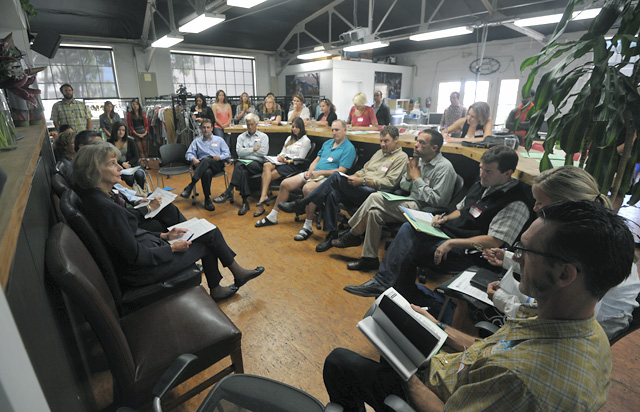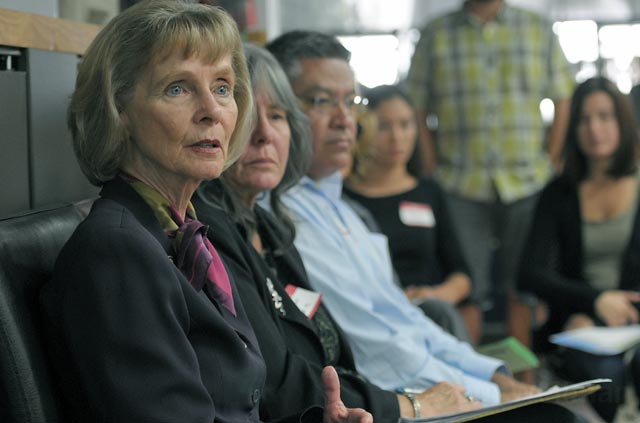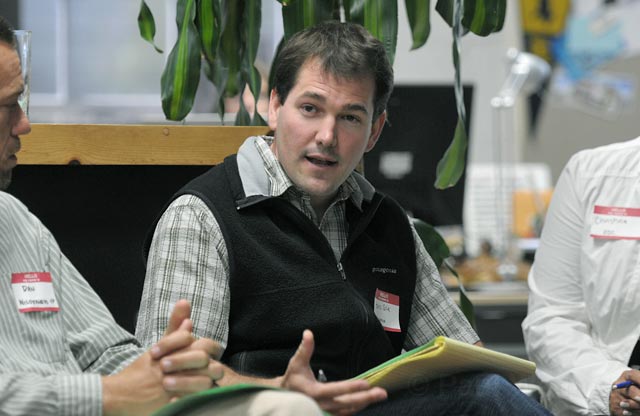Federal Cuts Threaten Outdoor Recreation Industry
Lois Capps Addresses Roundtable of Area Stakeholders

Monday proved to be a typical sunny Santa Barbara summer morning — the Santa Ynez Mountains were clear and bright, and the ocean stretched out toward the Channel Islands, only slightly obscured by fog. It was a perfect day for Congressmember Lois Capps to pay a visit to Horny Toad Activewear‘s headquarters on West Mason Street to host a roundtable discussion with representatives from the area’s outdoor recreation industry.
The talk was spurred by the threat of imminent budget cuts to conservation programs, such as the Land and Water Conservation Fund. As a point of reference for residents who may not realize how such funding impacts Santa Barbara County, many popular parks were acquired and have been maintained with federal money. The acquisition and development of Shoreline Park, for instance, was supported by $425,000 in federal fnding. Similarly, Carpinteria Bluff Park received $214,000. If the proposed reductions take place, the Department of the Interior would be funded at $9.9 billion, which is 7 percent below last year’s level.

In California alone, outdoor recreation contributes $46 billion annually to California’s economy and creates 408,000 jobs across the state. The industry generates $3.1 billion in annual state tax revenue and produces $28.1 billion annually in retail sales and services. Nationally, outdoor recreation revenue contributes $730 billion to the U.S. economy and supports nearly 6.5 million jobs.
In order to highlight the impact that these cuts would have — not only on the many nature preserves and parks in California but also on the companies whose business is outdoor recreation — Capps invited stakeholders to come and share their thoughts. There were over 20 people present, including 1st District Supervisor Salud Carbajal; Christina McGinnis of the Environmental Defense Center; Dan Fontaine with Wilderness Youth Project; Chris Orr from Santa Barbara Mountain Trail Volunteers; Hans Cole, Patagonia’s environmental grants manager; Kim Kimball, Gaviota Coast Planning Advisory Committee chair; Michael Cohen, owner of Santa Barbara Adventure Company, Michael Feeney, executive director of Land Trust of Santa Barbara County; and Carla Frisk, Trust for Public Land manager.

Seated in Horny Toad’s spacious and modern headquarters, the delegates mulled the impacts these budget cuts would have. “Recreation is big business,” said Capps. “It represents hundreds of billions of dollars in this country, and without protected public lands, this slice of the economic pie would not exist.” Although the potential impacts were frightening to all present, the mood was not one of fear but of resolve. Cohen spoke about how his company is currently hiring more people to fill the demand for surf trips and boat adventures to the Channel Islands. He called tourism Santa Barbara’s “last viable industry.” Cole said his organization “wouldn’t have a business if it weren’t for all this amazing public land.” It is no accident, said Capps, that corporations such as Patagonia are headquartered in the area given the natural beauty of the 23rd Congressional District.
Capps addressed attendees’ concerns and spoke to the incredible sway certain groups seem to have over Washington. Yet she also reminded that this was taking place not only in Washington but also in their very districts, and she would make it her “mandate” to speak on the behalf of local outdoor recreational companies. In turn, she encouraged her constituents to reach into their own communities, to make a national voice heard, and to educate future generations about the significance of the natural world and turn this education into advocacy.



